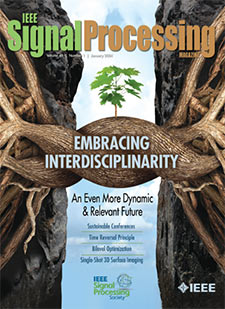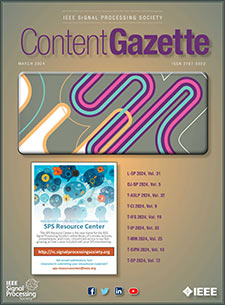- Our Story
- Publications & Resources
- Publications & Resources
- Publications
- IEEE Signal Processing Magazine
- IEEE Journal of Selected Topics in Signal Processing
- IEEE Signal Processing Letters
- IEEE/ACM Transactions on Audio Speech and Language Processing
- IEEE Transactions on Computational Imaging
- IEEE Transactions on Image Processing
- IEEE Transactions on Information Forensics and Security
- IEEE Transactions on Multimedia
- IEEE Transactions on Signal and Information Processing over Networks
- IEEE Transactions on Signal Processing
- IEEE TCI
- IEEE TSIPN
- Data & Challenges
- Submit Manuscript
- Guidelines
- Information for Authors
- Special Issue Deadlines
- Overview Articles
- Top Accessed Articles
- SPS Newsletter
- SigPort
- SPS Resource Center
- Publications Feedback
- Publications FAQ
- Blog
- News
- Dataset Papers
- Conferences & Events
- Community & Involvement
- Professional Development
- For Volunteers
- Information for Authors-OJSP
-
Home
Conferences14 April 2025 to 17 April 2025Conferences Events IEEE JSTSP Article IEEE Signal Processing Magazine IEEE TIFS Article IEEE TMM Article IEEE TSP Article Jobs in Signal Processing Lectures Machine Learning Seasonal Schools Signal Processing News SPM Article SPS Distinguished Lectures SPS Newsletter Article SPS Webinar SPS Webinars SPS Webinar Series Webinar webinars
-
Our Story
What is Signal Processing?

The technology we use, and even rely on, in our everyday lives –computers, radios, video, cell phones – is enabled by signal processing. Learn More » -
Publications & Resources
-
SPS Resources
- Signal Processing Magazine The premier publication of the society.
- SPS Newsletter Monthly updates in Signal Processing
- SPS Resource Center Online library of tutorials, lectures, and presentations.
- SigPort Online repository for reports, papers, and more.
- SPS Feed The latest news, events, and more from the world of Signal Processing.
-
SPS Resources
-
Conferences & Events
-
Community & Involvement
-
Membership
- Join SPS The IEEE Signal Processing Magazine, Conference, Discounts, Awards, Collaborations, and more!
- Chapter Locator Find your local chapter and connect with fellow industry professionals, academics and students
- Women in Signal Processing Networking and engagement opportunities for women across signal processing disciplines
- Students Scholarships, conference discounts, travel grants, SP Cup, VIP Cup, 5-MICC
- Young Professionals Career development opportunities, networking
- Get Involved
-
Technical Committees
- Applied Signal Processing Systems
- Audio and Acoustic Signal Processing
- Bio Imaging and Signal Processing
- Computational Imaging
- Image Video and Multidimensional Signal Processing
- Information Forensics and Security
- Machine Learning for Signal Processing
- Multimedia Signal Processing
- Sensor Array and Multichannel
- Signal Processing for Communication and Networking
- Signal Processing Theory and Methods
- Speech and Language Processing
- Technical Working Groups
- More TC Resources
-
Membership
-
Professional Development
-
Professional Development
- Mentoring Experiences for Underrepresented Young Researchers (ME-UYR)
- Micro Mentoring Experience Program (MiME)
- Distinguished Lecturer Program
- Distinguished Lecturers
- Distinguished Lecturer Nominations
- Past Lecturers
- Distinguished Industry Speaker Program
- Distinguished Industry Speakers
- Distinguished Industry Speaker Nominations
- Industry Resources
- IEEE Training Materials
- Jobs in Signal Processing: IEEE Job Site
-
Career Resources
- SPS Education Program Educational content in signal processing and related fields.
- Distinguished Lecturer Program Chapters have access to educators and authors in the fields of Signal Processing
- PROGRESS Initiative Promoting diversity in the field of signal processing.
- Job Opportunities Signal Processing and Technical Committee specific job opportunities
- Job Submission Form Employers may submit opportunities in the area of Signal Processing.
-
Professional Development
-
For Volunteers
-
For Board & Committee Members
- Board Agenda/Minutes* Agendas, minutes and supporting documentation for Board and Committee Members
- SPS Directory* Directory of volunteers, society and division directory for Board and Committee Members.
- Membership Development Reports* Insight into the Society’s month-over-month and year-over-year growths and declines for Board and Committee Members
-
For Board & Committee Members
Popular Pages
Today's:
- Submit a Manuscript
- (MLSP 2024) 2024 IEEE International Workshop on Machine Learning for Signal Processing
- Information for Authors
- (SLT 2024) 2024 IEEE Spoken Language Technology Workshop
- SPS Scholarship Program
- IEEE Signal Processing Letters
- IEEE/ACM Transactions on Audio Speech and Language Processing
- IEEE Transactions on Image Processing
- IEEE Transactions on Multimedia
- Conference Call for Papers
- IEEE Transactions on Information Forensics and Security
- Information for Authors-SPL
- Interview with Chetan Arora, Associate Professor, IIT Delhi, India
- Signal Processing 101
- IEEE Transactions on Signal Processing
All time:
- Information for Authors
- Submit a Manuscript
- IEEE Transactions on Image Processing
- 404 Page
- IEEE/ACM Transactions on Audio Speech and Language Processing
- IEEE Transactions on Information Forensics and Security
- IEEE Transactions on Multimedia
- IEEE Signal Processing Letters
- IEEE Transactions on Signal Processing
- Conferences & Events
- IEEE Journal of Selected Topics in Signal Processing
- Information for Authors-SPL
- Conference Call for Papers
- Signal Processing 101
- IEEE Signal Processing Magazine
Last viewed:
- Submit a Manuscript
- IEEE Transactions on Multimedia
- IEEE Signal Processing Letters
- Affiliates
- IEEE TCI Special Section on Computational Imaging using Synthetic Apertures
- Information for Authors
- PhD in Signal Processing
- Conferences
- (MLSP 2024) 2024 IEEE International Workshop on Machine Learning for Signal Processing
- SPS Scholarship Program
- Distinguished Lecturers
- IEEE Transactions on Image Processing
- Editorial Board
- EDICS
- IEEE/ACM Transactions on Audio Speech and Language Processing
Tatoglu, Akin. (Stevens Institute of Technology) “Modified monocular SLAM with concurrent model parameter identification”, (2015)
You are here
Newsletter Menu
Newsletter Categories
Top Reasons to Join SPS Today!
1. IEEE Signal Processing Magazine
2. Signal Processing Digital Library*
3. Inside Signal Processing Newsletter
4. SPS Resource Center
5. Career advancement & recognition
6. Discounts on conferences and publications
7. Professional networking
8. Communities for students, young professionals, and women
9. Volunteer opportunities
10. Coming soon! PDH/CEU credits
Click here to learn more.
News and Resources for Members of the IEEE Signal Processing Society
Tatoglu, Akin. (Stevens Institute of Technology) “Modified monocular SLAM with concurrent model parameter identification”, (2015)
Tatoglu, Akin. (Stevens Institute of Technology) “Modified monocular SLAM with concurrent model parameter identification”, (2015) Advisor: Pochiraju, Kishore
In order to navigate autonomously, mobile robots require an awareness of their position and a map of the surroundings. Determination of a robot's position in a map is called localization. In many cases a map of the surroundings may not exist or may be unreliable. Simultaneous Localization and Mapping (SLAM) algorithms determine both the position estimate and a map of the surroundings as the robot traverses its environment. SLAM considers the control input that directs the robot motion and the information from sensors such as a laser ranger, stereo camera or wheel rotation encoders to stochastically minimize the errors in position and map estimates. Monocular SLAM or MonoSLAM attempts the localization and mapping tasks with a single camera as the sensor. Challenges for generating accurate position and map information with MonoSLAM are numerous. Calibration of the depth-scaling of the camera, choice of the right motion and noise models, and the quality of the image generated by the sensor are major issues that need to be addressed before MonoSLAM can be effectively implemented.
In this thesis the effectiveness of MonoSLAM as a localization algorithm during navigation of mobile robots has been evaluated with a multi-ball drive mobility platform, as well as with robotic arm and linear actuation robot. Mapping and trajectory accuracies are investigated under various motion profiles. MonoSLAM algorithms have been extended by including real-time identification of motion and noise models. As MonoSLAM contains no information about the motion of the robot, a constant velocity model with acceleration noise is generally assumed. The location prediction from MonoSLAM is found to drift considerably during motion profile changes. This drift is attributed to artificial movement of landmarks due to the errors in Kalman gain computation introduced by the motion assumptions. In this effort, both motion and noise models are identified by an optical flow pre-processor. Optical flow analyzes the image stream for changes in robot dynamics and identifies an appropriate motion model used in localization. Another methodology based on Pearson product moment correlation (Pearson-R) is employed to detect motion behavior changes. In both methods, detected motion profiles are used to construct appropriate motion and noise models for localizing robotic machinery and mobile robots.
A modified SLAM algorithm, termed the CMPISLAM (SLAM with Concurrent Model Parameter Identification), is hypothesized and its performance has been evaluated. CMPISLAM introduces a pipelined structure in which two simultaneous analytical methods operate on a single stream of the image data. The position and map information updates after a short time delay required for identifying an appropriate motion model. Test cases are formulated to benchmark the performance of MonoSLAM and CMPISLAM under various motion profiles. The main contribution of this thesis is that the concurrent identification of motion model enables the use of MonoSLAM and its variants for robot navigation mitigating the need for sensors.
Open Calls
News & Announcements
- IEEE Women in Engineering News: Registration Open for 2016 WIE-ILC, Awards Program
- 2015 Annual Reporting and Rebate Requirements: Due 15 March
- Call for Proposals: GlobalSIP 2017
- Upcoming Distinguished Lecturers
- Call for Symposium Proposals - GlobalSIP 2016
- Women in Signal Processing at GlobalSIP 2015
- Signal Processing Conferences
Society News
- Reminder call for Nominations: IEEE Fellow Class of 2017: Deadline 1 March
- Reminder Call for Nominations: IEEE Technical Field Awards: Deadline 31 January
- 52 SPS Members Elevated to Fellow
- Call for Nominations: IEEE Signal Processing Letters Editor-in-Chief
- 28 Signal Processing Society Members Elevated to Senior Member
Conference News
Research Opportunities
Publications News
Chapter & DL News
PhD Theses
- Keator, David B. (University of California, Irvine) “Probabilistic Models for Brain Image Collection, Classification and Functional Connectivity”, (2015)
- Meyer, Florian (Vienna University of Technology) "Navigation and Tracking in Networks: Distributed Algorithms for Cooperative Estimation and Information-Seeking Control" (2015)
Initiatives & Trends
Member Highlights
SPS on Twitter
- DEADLINE EXTENDED: The 2023 IEEE International Workshop on Machine Learning for Signal Processing is now accepting… https://t.co/NLH2u19a3y
- ONE MONTH OUT! We are celebrating the inaugural SPS Day on 2 June, honoring the date the Society was established in… https://t.co/V6Z3wKGK1O
- The new SPS Scholarship Program welcomes applications from students interested in pursuing signal processing educat… https://t.co/0aYPMDSWDj
- CALL FOR PAPERS: The IEEE Journal of Selected Topics in Signal Processing is now seeking submissions for a Special… https://t.co/NPCGrSjQbh
- Test your knowledge of signal processing history with our April trivia! Our 75th anniversary celebration continues:… https://t.co/4xal7voFER
Home | Sitemap | Contact | Accessibility | Nondiscrimination Policy | IEEE Ethics Reporting | IEEE Privacy Policy | Terms | Feedback
© Copyright 2024 IEEE – All rights reserved. Use of this website signifies your agreement to the IEEE Terms and Conditions.
A not-for-profit organization, IEEE is the world's largest technical professional organization dedicated to advancing technology for the benefit of humanity.







